The Arrows of Time Read online
Page 3
‘It should take about three and a half bells to reach the Station,’ Tarquinia predicted.
Ramiro said, ‘Isn’t it usually six?’ No wonder he felt so much heavier than on his last flight.
‘This gnat was designed for towing cargo,’ Tarquinia explained. ‘I flew it myself, the last time they upgraded the Station. I was carrying a whole prefabricated living unit, but coming back, with no external load—’ She brought six gloved fingertips together, then flung her hand forward as she spread them.
Ramiro didn’t want to risk insulting her again, so he fought back the urge to ask her exactly how much cooling air they’d brought. Carla’s glorious optical rebounders required no fuel, with the gnat’s gain in kinetic energy coming solely from the creation of light, but the frequency-shifting mirrors that enabled that trick still generated waste heat. The more powerful the engines, the more air it took to carry heat away into the void.
Tarquinia panned across the console’s map to show a featureless marker far from the Station itself. The rogue gnat had travelled a long way from its starting point – away from the Object too, with no apparent destination in sight – though in the latest observations it had been decelerating. With its engines now aimed in the opposite direction to their initial orientation there was no spillage from them reaching the Peerless; if the astronomers hadn’t known the gnat’s earlier trajectory they would never have been able to locate it. Ramiro would have enjoyed the challenge of instructing a second unoccupied gnat to seek out the first for a mutually destructive collision at the greatest possible velocity, but the gentler approach was going to be much trickier to achieve, and from his present perspective a great deal less enjoyable.
‘What were they thinking?’ he asked wearily.
‘Who?’
‘Pio’s group. We get all those earnest speeches about their fears for our descendants, and then suddenly they’re trying . . . what? Some kind of feint involving the Object?’
‘Feint?’ Tarquinia pondered the idea. ‘Whatever they’ve programmed the gnat to do, I don’t see how they could call it off now, even if they wanted to.’
Ramiro took her point: the kind of communications system that could connect to such a distant target wasn’t something a disgruntled minority could have set up in secret out on the slopes. ‘They might still have a shutdown code that they could offer us,’ he said. ‘Something we’d have to transmit on their behalf.’
‘That’s possible,’ Tarquinia agreed. ‘Or they might just offer us the flight plan itself. It was pure luck that we spotted the thing at all; they might have thought they’d still have that to bargain with.’
Ramiro buzzed disdainfully. ‘Some people are very bad losers.’
Tarquinia said, ‘I don’t think it’s that. It’s not just pride; I think they’re genuinely afraid. I don’t know what I’d do, myself, if I honestly believed that everyone around me had just voted for a literally suicidal folly.’
‘If you honestly believed it, you’d have a good reason,’ Ramiro countered. ‘You’d try to talk the rest of us around, while staying open to the chance that you might be mistaken. There’d be no need for extortion.’
Tarquinia wasn’t convinced. ‘It’s a strange situation that we’re in. We have a whole range of ideas about the interaction of thermodynamic arrows, some of them better supported than others, but none of them conclusive. And if we can’t reconcile everyone’s intuitions, what counts as a perfect solution? Even if we’ve all listened to each other’s arguments in good faith, it’s always possible that someone’s going to end up believing that we’re heading for annihilation – and that by the time the evidence is indisputable, it will be far too late to retreat.’
Greta said, ‘We have a theory.’
Ramiro strained to hear her; the UV link to the Peerless was noisier than anything he’d experienced before.
‘So far, the rogue’s just followed a straight line,’ she said. ‘Maximum acceleration away from the Station, then maximum deceleration, without veering at all. If it keeps this up, we know exactly where it’s going to come to a halt – and there’s nothing there. It’s not a destination. It’s a staging point.’
‘So then it turns and heads for the Peerless?’ Tarquinia suggested. ‘The rogue’s instructors are planning to announce that a gnat loaded with antimatter is on its way – but they’ve offset it far enough from the Station that they think we’ll have no idea where to look for it.’
‘That’s a possibility,’ Greta replied. ‘But they might not be trying to bargain at all. Why enter into negotiations if they can get what they want directly?’
Ramiro felt sick. ‘You think they’ll try to destroy the engines, without warning?’ Crashing a gnat into the base of the mountain – with either enough antimatter or enough sheer kinetic energy to do the job – would probably kill half the population in the process.
Greta’s voice crackled.
‘Say again,’ Tarquinia requested.
‘Not the engines. The corridor.’
Ramiro struggled to hear what followed, but eventually Greta’s theory became clear. She believed the rogue was doing nothing more than giving itself a run-up: travelling away from the Station in order to turn around and come back – with as much velocity as possible. Its target wasn’t the Peerless. It was the Station.
Given the angle of arrival, the collision would set the Station on a grazing trajectory towards the Object. When all those empty workshops and living quarters skidded across the surface of the asteroid, the explosion would send a plume of antimatter far out into the void – and the geometry of the impact would guarantee that the plume polluted a region that the Peerless needed to traverse if it was to commence the turnaround.
The hazard would take a generation to disperse. If they tried to steer the mountain through the debris, the system that protected the slopes from the usual smattering of tiny specks of antimatter would be utterly overwhelmed – and the failures would not be embarrassing spot fires, they’d be blasts that tore cavernous holes in the mountainside and risked setting everything ablaze.
‘Can we move the Station?’ Ramiro asked. The habitat’s own engines were weak things, intended to do no more than stabilise it in orbit around the Object, but if the rogue gnat could shift it with a few bells’ worth of accumulated power, surely their own benign craft could spend the same time gently towing it out of harm’s way?
‘Not quickly enough,’ Tarquinia replied. ‘With a load as massive as that, the limiting factor’s not our engines, it’s the strength of the tow ropes.’
‘Right.’ Ramiro had been wondering why the rogue wasn’t simply dragging the Station to its demise, but apart from the question of which approach would be the easiest to automate, the least conspicuous and the hardest to prevent, the go-away-come-back-and-crash method would actually deliver a faster result.
Greta said, ‘The only choice is to intercept the rogue.’
‘You couldn’t have worked all this out before we left?’ Ramiro complained. If the rogue came straight back towards the Station, there’d be nothing more to learn from its navigation system. They should have just tried to destroy it from the start.
The console emitted Gretaesque noises, then the link cut out completely.
Tarquinia turned to Ramiro. ‘Don’t worry,’ she said. ‘If it’s as predictable as they’re saying, we’ll match trajectories easily.’
‘You’re not the one who’ll have to climb on board and shut it down.’
‘If there’s any problem, we do have other options.’ Tarquinia gestured to the hold behind their couches. ‘Timed explosives. All we have to do is attach one of these and get out of the way.’
Ramiro could not have been less comforted. ‘High-velocity debris in the void – possibly spiced with antimatter. Do you really want to fly through that?’
‘If we give ourselves enough time, the risk will be negligible.’
‘And how much time is ours to give?’
Tarquinia t
urned to the navigation console, instructing it through the photonic corset that wrapped her torso beneath the cooling bag. When she’d finished, a flight plan appeared on the screen.
‘If Greta’s theory is right,’ Tarquinia said, ‘we’ll be able to match trajectories with the rogue in slightly more than five bells – about half a bell before the impact. If we set the explosive’s timer for three chimes, that will leave another three chimes for the debris to spread out – enough for the bulk of it to miss the Station. And in three chimes, we can put almost three severances between ourselves and the explosion. The rogue will still be accelerating as fast as it can towards the Station, so if we scarper in the opposite direction we’ll get the benefit of both engines.’
Ramiro was slightly mollified. Three severances wasn’t much on the scale of this map, but it was more than six gross times the height of the Peerless. The shrapnel they were fleeing would never slow down, but it would grow ever sparser.
‘So is Greta right or not?’ he asked. They’d lost the link with the Peerless, so they’d had no updates on the rogue’s actual behaviour.
Tarquinia flicked a switch on the console; a moment later the link was restored.
‘What did you do?’ Ramiro demanded.
‘I vented some air through an outlet next to the photoreceptor,’ Tarquinia explained. ‘Sometimes it just gets dusty.’
Greta asked anxiously, ‘Can you hear me?’
‘Loud and clear,’ Tarquinia replied.
‘The rogue came to a halt three lapses ago, and reversed without a pause. It’s headed straight back to the Station.’
‘Understood,’ Tarquinia said cheerfully. She made no move Ramiro could see, but she must have sent a command through her corset because the flight plan on the screen changed from grey to red – transformed from a hypothetical doodle to a set of firm instructions. The sky through the dome rotated a quarter-turn as the gnat swung around to redirect the engines.
‘We’re really going to do this?’ Ramiro asked numbly. He’d been half-hoping that the rogue would set out for the Peerless instead; forewarned, the mountain’s defenders could have launched any number of pilotless gnats against it, so the risk of it actually striking its target would have been vanishingly small. ‘What if we programmed a collision instead?’ he suggested. ‘Then we can climb out here and wait to be rescued.’ That would mean half a day in the void, but they had locator beacons on their cooling bags and they could take a couple of extra air tanks from the gnat.
Greta said, ‘Absolutely not!’
Tarquinia gave the idea some thought. ‘We don’t know the rogue’s trajectory with enough precision to ensure that we’d hit it, but I suppose we could use the explosives to make a near miss almost as good. The only trouble is . . . it wouldn’t take much of a course change by the rogue to ruin the whole plan. Even if you reprogrammed our navigation system so they could tweak the trajectory from the Peerless, the explosive isn’t that sophisticated: once we set the time delay, it would be impossible to change it remotely.’
Ramiro was prepared to accept this argument, but Greta felt obliged to add her own reasons. ‘The Council still wants the rogue’s navigation system analysed,’ she said. ‘The trajectory might be obvious now, but there could be other information about the perpetrators that can be gleaned by studying what they’ve done.’
‘Yeah, I’m sure they signed their names in the software.’ Ramiro didn’t doubt that there was such a thing as programming style, but the idea of identifying a saboteur on the basis of anything so vague was ludicrous. ‘I’ll be happy if we manage to keep the Station from being hit, but once that’s guaranteed I’m not risking my life humouring the Councillors.’
Greta didn’t reply; she knew better than to push him now.
‘So . . . we’re going ahead with the interception?’ Tarquinia asked tactfully.
Ramiro stared at the flight plan: the map of their future for the next five bells. As far as he knew, on every other occasion when two gnats had come together in the void they’d had cooperating pilots, and their main engines had been shut off for the approach. But here were the trajectories, meeting up perfectly right before his eyes.
‘Why not?’ he said. ‘What could possibly go wrong?’
At Ramiro’s request, Tarquinia showed him a version of the flight plan with their acceleration marked. Translating between the standard maps and the starry emptiness around her might have been second nature to Tarquinia, but the only way Ramiro could hope to stay oriented was by knowing which direction would feel like ‘up’ to him for the various stages along the route.
They’d already acquired a substantial velocity towards the Station on their way from the Peerless, and now they were veering sideways, bringing them closer to the rogue’s trajectory. But in a bell and a quarter they’d begin to swing the engines around, until they were using all their power to reverse. Ramiro found it utterly perverse that they could have caught up with the rogue much sooner if it had been fleeing from them, rather than heading their way: the need to match velocities wouldn’t have forced them to waste time going backwards.
‘Do you have a tuneable coherer in your toolbox?’ he asked Tarquinia.
‘Of course. Why?’
‘I think we’ll need to burn the proximity sensors, before we get too close.’ For long-range navigation the gnats relied on beacons, but to dock they picked up the reflections of their surroundings in infrared. The rogue had no hope of seeing them coming from afar, but once they tried to sidle up to it, it would know that it had company.
Tarquinia said, ‘It won’t have a lot of freedom for evasive action; if it delays its arrival too much, the Station will have moved around in its orbit. And it can’t make up lost time later; the engines are running at full power as it is.’
‘It could still shift sideways with the manoeuvring engines,’ Ramiro suggested. ‘There’d be nothing to stop it recovering from that – and it would be enough to make our job impossible.’ Once they were beside the rogue any sudden change in the main engines’ thrust would see it plummet out of sight, but it would only take the tiniest swerve to snap a boarding rope slung between the vehicles.
‘True enough,’ Tarquinia conceded. ‘But we’ll need to combine the coherer with some kind of sighting scope.’
She unplugged the photonic cable from her corset, then clambered down into the hold. As she rummaged around for the parts she needed, Ramiro contemplated her empty couch and unattended console. He’d happily imagined the Peerless driving itself for years – but in this fragile craft, rushing towards a near-collision, even the briefest absence of the pilot was enough to unsettle him.
‘How about this?’ Tarquinia handed him a scope, three clamps and a coherer. ‘The range of the sensors would be about a saunter. Through this, you should be able to see them at twice that distance.’
Ramiro said, ‘We’ll need to calibrate the alignment.’
‘Of course. Put it together, then I’ll get the optics workbench.’
‘You have an optics workbench?’
‘A small one.’
The bench was half the size of Ramiro’s torso, but it let them measure the angle between the scope’s axis and the coherer’s beam. By the time he had the crude weapon aligned, he looked out through the dome to see that the gnat had rotated again without him even noticing. The engines were dragging them backwards now, giving them a trajectory much like the parabola of a ball thrown under gravity – albeit in some very strange game where the skill lay more in controlling the direction of the ongoing force than in the initial toss.
‘Do you have children?’ he asked Tarquinia.
‘No.’
‘So what did your brother say, when you told him about this?’
‘He wished me a safe journey,’ Tarquinia replied.
Ramiro said, ‘If I’d told my uncle, I probably wouldn’t be here at all.’
‘Hmm.’ Tarquinia sounded sympathetic, but reluctant to take sides. ‘So let’s neither o
f us do anything reckless,’ she said. ‘If we play this right, your family need never even know that you were out here.’
The gnat reached the top of its parabola and started falling back towards the Station. Ramiro glanced up from the navigation console, unable to dismiss a stubborn intuition that the event ought to be visible somehow, but nothing in the view through the dome had changed.
The Peerless was still tracking the rogue and sending updates; the thing was five dozen severances away, off to Ramiro’s left and ‘below’ him – in the sense of ‘down’ rammed into his body by the engines, the opposite of that in his tossed-ball analogy. He slid his head past the edge of the couch and examined the sky with his rear gaze, knowing full well that there was nothing he could hope to see. Even if he’d slipped on the ultraviolet goggles that Tarquinia had given him from her trove of gadgets, the rogue’s engines were pointed away from him. A similarly equipped passenger on the rogue might have seen the UV flare from the gnat ahead of them, but Ramiro was hoping that the saboteurs had had no chance to augment the vehicle with extra hardware.
‘We need to eat now,’ Tarquinia declared, tugging at the lid on the store beside her couch.
‘I don’t have much appetite,’ Ramiro protested.
‘That’s not the point,’ Tarquinia said flatly. ‘You’ve only had half a night’s sleep, and you’re going to need to be alert for this. It’ll take a bell for the loaves to be digested, so this is mealtime.’
Ramiro buzzed at her presumptuousness. ‘Yes, Uncle.’
‘I’m your pilot, that’s worse. Can your uncle toss you out into the void?’
He took the loaf that she handed him and bit into it dutifully. It was a struggle to force the chewed food down his oesophagus; half the flesh that usually helped him to swallow had been ossified.

 Zendegi
Zendegi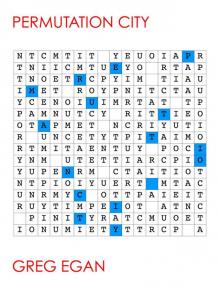 Permutation City
Permutation City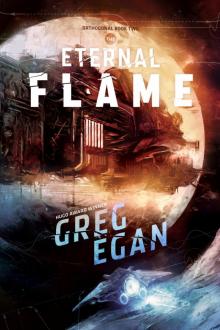 The Eternal Flame
The Eternal Flame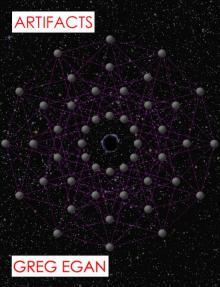 Artifacts
Artifacts Wang's Carpets
Wang's Carpets Dichronauts
Dichronauts Incandescence
Incandescence Teranesia
Teranesia Schild's Ladder
Schild's Ladder Quarantine
Quarantine The Four Thousand, the Eight Hundred
The Four Thousand, the Eight Hundred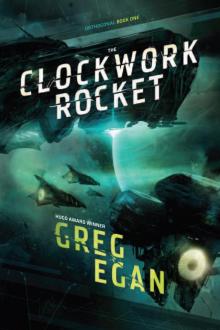 The Clockwork Rocket
The Clockwork Rocket Zeitgeber
Zeitgeber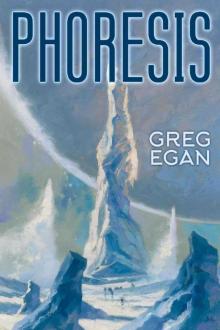 Phoresis
Phoresis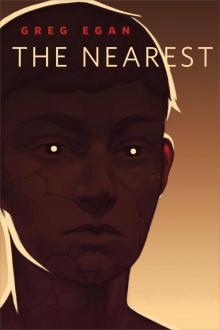 The Nearest
The Nearest Diaspora
Diaspora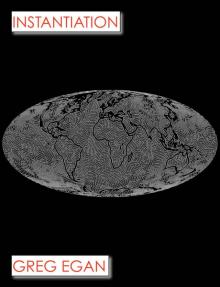 Instantiation
Instantiation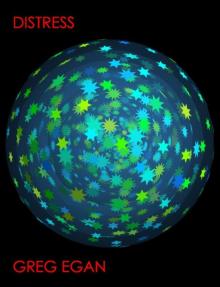 Distress
Distress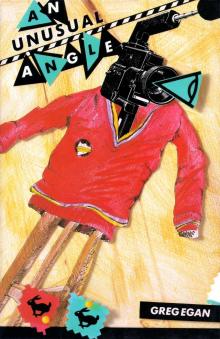 An Unusual Angle
An Unusual Angle Oceanic
Oceanic The Arrows of Time
The Arrows of Time Axiomatic
Axiomatic![Anthology 2. Luminous [1998, 2010] Read online](http://i1.bookreadfree.com/i/03/18/anthology_2_luminous_1998_2010_preview.jpg) Anthology 2. Luminous [1998, 2010]
Anthology 2. Luminous [1998, 2010]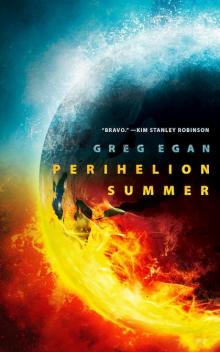 Perihelion Summer
Perihelion Summer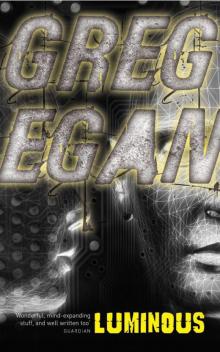 Luminous
Luminous